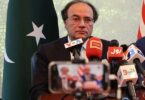The deadline of Afghan refugees stay in Pakistan expires next month and there are bold indications that federal government will give another extension for unnecessarily prolonging their stay in the country particularly in frontline provinces of Baluchistan and Khyber Pukhtunkhwa which are the worst hit by the acts of terrorism planned on the soil of Afghanistan. In the past the governments of these provinces have opposed tooth and nail the extensions in deadlines for the repatriation of millions Afghan nationals. The federal government has given nine extensions so far, ignoring the genuine resistance from the provincial governments.
After the Soviet invasion of Afghanistan, Pakistan and Iran received bulk of the influx of Afghan refugees. Iran adopted wise policy about refugees by regulating their movement outside camps and banning them for getting residential facilities in the cities and rural areas. On the contrary, the autocratic government in Pakistan allowed the free movement of Afghan nationals and did not visualize its dangerous consequences for the law and order in the country. The succeeding elected governments of the two mainstream political parties adopted and oblivious attitude towards emerging threat of terrorism because of the presence of unbridled millions of Afghan refugees. It was the quasi-civilian government of President Musharraf which took a firm stance on the repatriation of registered Afghan refugees and every day hundreds of families used to avail the repatriation benefits from the UNHCR every day and took return journey.
In the succeeding government of PPP in 2008, Afghan refugees’ repatriation programme was brought to the standstill. After the terrorist attack on APS, the repatriation process of Afghan refugees was started again but it went on with snail pace as the Ministry of SAFRON did not show interest in chalking out a comprehensive refugee repatriation plan in collaboration with the UNHCR to get the financial assistance from foreign donors. In January last year, an official of this ministry talked about the emergency repatriation plan of Afghan refugees. It was also supported by the then Afghan Ambassador in Islamabad Umer Zakhelwal by urging a Jirga of refugee elders that time has come for them to pack up for the imminent homeward journey to participate in the inevitable task of reconstruction of Afghanistan. But afterwards nothing was heard about this plan because vested political interest was given preference over national interest. Interestingly, in the month of February last year SAFRON Minister Abdul Qadir Baluch, while talking to the US Deputy Secretary of State Nancy Izoo Jackson, requested for assistance in working out the repatriation plan, although he acknowledged the multiple and complex security , social and economic problems. As a matter of fact the top leadership of an allied party of PML-N government Pukhtunkhwa Milli Awami Party had been openly opposing the sending back home of Afghan refugees and is still sticking to this stance. Likewise, the leadership of another so called Pukhtun Nationalist Party ANP is also not supportive of the return of Afghan nationals to Afghanistan.
During the current month the periodicity of terrorist attacks has increased in Baluchistan. Unlike the Pak-Afghan border in Khyber Pukhtunkhwa, the border in Baluchistan is free for all for the entry of Afghan Nationals. There are increasing complaints that the Afghan Refugee families who avail the repatriation benefits from UNHCR center at Peshawar manage their comeback into Pakistan via loose Chaman border as their reentry without travel documents through joint border in Khyber Pukhtunkhwa has become pretty difficult.
In his analysis on the recent terrorist attacks, Home Minister of Baluchistan Laiqat Shahwani described the presence of over one million Afghan Refugees in the province as a major risk factor and strongly advocated their repatriation to the country of their origin besides strictly regulating their daily movement by keeping them under strict surveillance. The repatriation process has been resumed in March but has lost its steam as no repatriation plan was either put in place by the previous governments and nor by the present one. Ministry of SAFRON is responsible for working out this plan in consultation with the UNHCR. At present hardly two or three Afghan Refugee families opt for repatriation at Peshawar UNHCR center with hidden resolve to come back via Chaman border in Baluchistan. That is why from Quetta center the repatriation rate is almost zero. The risk factor connected with the stay of millions of Afghan nationals and their reentry into Pakistan after repatriation without travel documents through border in Baluchistan need utmost attention of the federal government. Hopefully, a comprehensive repatriation plan will be prepared without any further delay.






